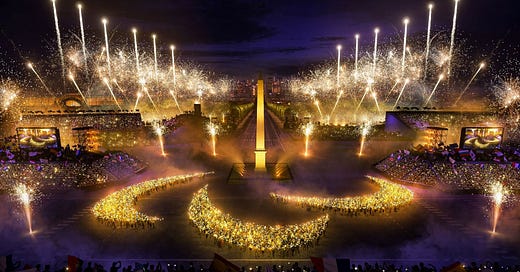Propaganda and Performance at The Olympics
Fighting for national pride on the pommel horse
Before getting too excited about the fact that China got as many Gold medals as the US at the Paris Olympics, it is worth looking back at the use of the medals table to “prove” the superiority of one system over another. More likely it is politically driven efforts to secure gold, including by focusing on sports, notably swimming, where one individual can win multiple medals, or obscure disciplines with few countries competing. How much superiority the Latin Olympics slogan “Citius, Altius, Fortius – “Faster, Higher, Stronger” – actually proves is debatable, since often superiority is achieved with the use of performance-enhancing drugs.
In the days when the Soviet Union ruled most of eastern and central Europe's large tracts of Central Asia, there was no doubt about which country would easily top the table. Thus in 1972, the Soviets got 50 golds while the US had a mere 33. Third in the league was East Germany, the Soviet satellite and eager student of Moscow’s methods. These two exemplars of Communist party rule did even better in 1976 with the Soviets at 49, east Germany at 40, and the US a distant third at 34. Even without a US boycott of the Moscow games in 1980, the pair would easily have been first and second again. The US absence also enabled the Soviet party’s close allies Bulgaria and Cuba to figure prominently.
The US only made it to the top of the list in 1984 thanks to a revenge boycott of the Los Angeles games by the Soviets and their allies. This brought the US back to the top and enabled China to get into the top four for the first time. But Soviet/ East German supremacy was not over, pushing the US into third place in 1988 and second in 1992 when the recently collapsed Soviet Union fielded a Unified Team from its erstwhile subject states.
The Olympics was supposed to be a contest between individuals but has become a nationalist frenzy – but only for a small number of states that can afford massive, sophisticated training programs, and often with the help of drugs. China may be on top but the world’s most populous nation, India, didn’t win a single gold in Paris. Nor did Mexico or Turkey. Africa’s most populous country, Nigeria, won no medal of any color. As for Bangladesh, with a population of 170 million, although it has competed in every Olympics since 1984, it has never won even a bronze medal. Apart from a few niche events where there is a strong local tradition, such as badminton in Malaysia and Indonesia, governments in most countries lack the will to throw large sums at training up a few (with luck) winners.
There are better, cheaper investments, including performance-enhancing drugs. In the 1980 Summer Olympics, a 1989 Australian study found that "There is hardly a medal winner at the Moscow Games, certainly not a gold medal winner, who is not on one sort of drug or another: usually several kinds. The Moscow Games might as well have been called the Chemists' Games."
But accusations against the Russians and the Chinese leave out the fact that literally too many do it. In the 2004 games in Athens, for instance, athletes from Morocco, Hungary, Germany, Ukraine, Greece, Moldova, the US, Puerto Rico, Russia, Myanmar, India, Belarus, Kenya, Ireland, Kyrgyzstan and Uzbekistan were found to have violated anti-doping regulations.
That doesn’t mean other countries didn’t do it. “In 2008 in Beijing, the initial rate of positive findings was lower than at Athens in 2004, but the prevalence of doping had not necessarily decreased; the technology for creating and concealing drugs had become more sophisticated, and a number of drugs could not be detected.” The suspicion is that the chemists constantly stay ahead of the inspectors.
But that doesn’t take away from the joy of watching truly superb athletes like the American gymnast Simone Biles, or the men’s100-meter final, in which seven out of eight runners were involved in a photo finish in which the winner won by a five-thousandth of a second, or beach volleyball under the Eiffel Tower. Citius, Altius, Fortius indeed.





A well written article but no byline. Did HK have a separate medal count?